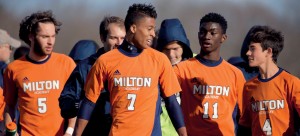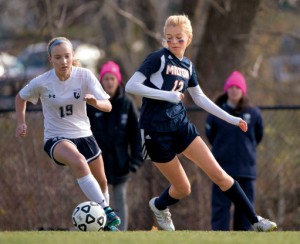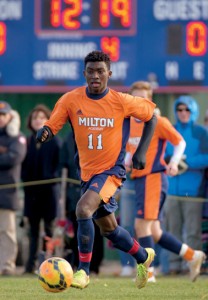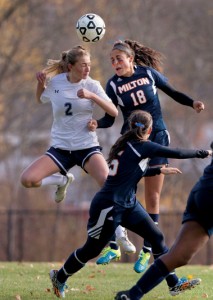 Today’s soccer programs showcase Milton sports tradition: sportsmanship; old-fashioned hard work out on the field, rain or shine; practicing skills; working as a team. They also reflect the growth of youth soccer, specifically club programs. Many of today’s players come to Milton with a high level of play and talent. Overall, the mission for boys’ and girls’ teams is to play good soccer. Scoring goals is great, but that is only one part of the game.
Today’s soccer programs showcase Milton sports tradition: sportsmanship; old-fashioned hard work out on the field, rain or shine; practicing skills; working as a team. They also reflect the growth of youth soccer, specifically club programs. Many of today’s players come to Milton with a high level of play and talent. Overall, the mission for boys’ and girls’ teams is to play good soccer. Scoring goals is great, but that is only one part of the game.
The boys’ varsity soccer team had a perfect season. They were undefeated and earned the Independent School League and New England Championship titles. Their accomplishments are historic: They are only the second team in ISL history to finish with a 15–0 record. Most important to coach Chris Kane, however, is that the league awarded his team the Mark H. Blood Trophy for outstanding sportsmanship.
“The players know that consistency and focus are key elements to success, and they know not to take anything for granted,” says Coach Kane, who has coached the boys for five years. “This year, the team’s talent, attention and investment were phenomenal. It’s easy to lose focus over a 19-game season, through a 90-minute game, through six days together every week. They did an incredible job of keeping that focus strong, that intensity high, and that competitiveness keen. They also brought that focus and attention to other areas, on and off campus.”
 The best way to understand why this team was so good was to watch them play. Their play was fluid and focused; the ball passed quickly between players, rarely leaving their possession. As fast as their game appeared, the players were actually taking their time and keeping it simple, wearing their opponents out. Players on the field talked to each other constantly, and teammates on the deep, talented bench, encouraged and supported. A goal was cause for quick celebration, but then they got back to focus, attention and steady play.
The best way to understand why this team was so good was to watch them play. Their play was fluid and focused; the ball passed quickly between players, rarely leaving their possession. As fast as their game appeared, the players were actually taking their time and keeping it simple, wearing their opponents out. Players on the field talked to each other constantly, and teammates on the deep, talented bench, encouraged and supported. A goal was cause for quick celebration, but then they got back to focus, attention and steady play.
Five seniors were four-year varsity team members. These included team captains Adam Bramson ’16, Shay Quintin ’16 and Luis Viceira ’16. They say this year’s team was the result of four years of hard work, discipline and maturity, under the strong leadership of Coach Kane.
“Our biggest challenge this year was not repeating last year, when we went into some games underprepared,” says Adam. “We lost title games against teams we should have beaten. This year, we knew how good we were and it was about not letting up in games. We had no slip-ups.”
“We had so many seniors that play a big role on the team,” says Luis. “They pushed each other and the younger players to play their best. And with a continuing core of players each year, it all resulted in great team chemistry.”
In many games this season, Milton players dominated from the first few seconds until the final whistle. Coach Kane made sure to take advantage of all the team’s talent.
 “Out of respect for our opponents, we took our starters out if we had a big lead,” he says. “We got the younger, less experienced guys out there when situations allowed, and it was great for their development. We had 15 straight shutouts, with our bench playing significant minutes, in many, if not all of those games. I’m most proud of the fact that the season was truly a team effort. Every single player on the team contributed to those results.”
“Out of respect for our opponents, we took our starters out if we had a big lead,” he says. “We got the younger, less experienced guys out there when situations allowed, and it was great for their development. We had 15 straight shutouts, with our bench playing significant minutes, in many, if not all of those games. I’m most proud of the fact that the season was truly a team effort. Every single player on the team contributed to those results.”
The girls’ ISL season was more mixed, ending 5–6–1. But the girls’ strong team culture, cultivated over years, led to positive outlooks on games when the scoreboard didn’t go their way. Co-captains Kelli Quinn ’16 and Deanna Ferrante ’16 said this year’s team had a great dynamic, and they played a “team’s game,” with goals spread out among a lot of players.
“There’s a remarkable culture with Milton girls’ soccer that focuses on the right and important goals,” says coach Peter Kahn, who has coached the team for 11 years. “We try to instill the idea that we’re trying to do better — as individual players and as a team. We focus on the things we can control, like how hard you work in the game, how you support each other, and your training habits. Those are more important than things you can’t control, like when a player on the other team hits a great corner shot and our players hit the post three times. Because this approach is already built into the culture, some of the challenges are easier to manage.”
“When I took over the boys’ program, I was inspired by the sense of team and family culture Peter had fostered in the girls’ program,” says Coach Kane. “I’ve sought to replicate that and build it into our program.” The two teams also have great camaraderie, at times combining practices and supporting each other from the sidelines when they can.
 Members of the girls’ team call themselves the Wolfpack, based on Rudyard Kipling’s poem “The Law of the Jungle.” They don’t take the name lightly. On game days, they are fierce and determined. For home games, they line up in the locker room and march, in complete silence, down to the field in two columns after high-fiving assistant coach Jamie LaRochelle (science department faculty). At the bench, they dump their bags and gear, still in silence. A player cues the music, Flo Rida’s “My House,” and they begin their warm-ups — choreographed, like a Maori war dance.
Members of the girls’ team call themselves the Wolfpack, based on Rudyard Kipling’s poem “The Law of the Jungle.” They don’t take the name lightly. On game days, they are fierce and determined. For home games, they line up in the locker room and march, in complete silence, down to the field in two columns after high-fiving assistant coach Jamie LaRochelle (science department faculty). At the bench, they dump their bags and gear, still in silence. A player cues the music, Flo Rida’s “My House,” and they begin their warm-ups — choreographed, like a Maori war dance.
Once the game begins, the silence disappears, and like the boys’ team, the girls are constantly talking to each other — coordinating shots or shouting encouragement. The play is fast and incredibly physical, with a lot of contact between opposing players. From the sidelines, Coach Kahn encourages and points out good plays.
“The best game we played was against Nobles, even though we lost 1–0,” says Deanna. “Everyone’s heads and hearts were in it. That was the best soccer we played all season, and it showed our progression as a team.”
Coach Kahn agrees. “Nobles was the better team that day, but I was really pleased with the way, immediately after the game, the girls’ assessment of their work was positive. There was a sense of proud accomplishment.”
by Liz Matson



